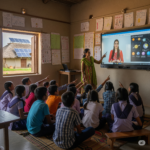
The Socio-Political Responsibility of Young Citizens
Redefining Youth Engagement in Governance and Community Building
Key Metrics:
- Youth Demographics: India’s youth population accounts for over 65%, representing a powerful force for socio-political change.
- Employment Challenge: India’s unemployment rate stands at 7.8% (CMIE, 2023), disproportionately affecting young citizens and driving discussions around governance.
- Global Comparison: Youth civic engagement in India lags behind countries like the United States, where 46% of young people participate in local community initiatives (Pew Research).
News Body
In a rapidly evolving India, young citizens are increasingly stepping into roles that transcend traditional boundaries of activism and politics. With the nation standing at a crossroads of demographic dividend and socio-economic challenges, the onus is on its youth to balance their aspirations with responsibilities, shaping a better future for themselves and the country.
Beyond Elections: Civic Engagement as a Responsibility
While voting is an essential aspect of democracy, the socio-political responsibility of young citizens extends far beyond casting ballots. Grassroots initiatives led by young Indians are addressing challenges like unemployment, environmental degradation, and gender inequality.
For instance, youth-driven movements like Fridays for Future India have pushed environmental issues to the forefront, influencing policy discussions. Similarly, community initiatives such as education programs in slums and digital literacy drives in rural areas highlight the transformative impact of young individuals taking ownership of local problems.
Navigating the Governance Divide
India’s governance system often presents a dual challenge: while urban youth have access to better resources and platforms, rural youth face systemic barriers like poor infrastructure and limited civic awareness. Addressing this divide requires targeted efforts to empower rural communities through programs like the Digital India initiative, which has brought digital governance tools to remote areas.
Moreover, government schemes like Deen Dayal Upadhyaya Grameen Kaushalya Yojana (DDU-GKY) focus on enhancing rural youth employability, indirectly encouraging them to engage with socio-economic governance. However, these programs need greater implementation efficiency and awareness campaigns to achieve their potential.
Breaking the Stigma Around Politics
A significant hurdle to youth participation in governance is the widespread perception of politics as a corrupt and unclean profession. This sentiment, more pronounced among urban and affluent youth, limits meaningful engagement.
However, examples like Raghav Chadha, a young leader from the Aam Aadmi Party, showcase how youth in politics can drive change. Chadha’s work on water resource management in Delhi has set an example of leadership focused on problem-solving rather than rhetoric.
Changing the narrative around politics requires efforts from educational institutions and media to present it as a tool for societal transformation rather than a battleground for power.
Harnessing Technology for Governance
The rapid rise of digital platforms has revolutionized how young citizens engage with socio-political issues. From tracking government spending through apps like MyGov to amplifying grassroots causes on social media, technology is bridging gaps between governance and the governed.
However, this reliance on digital tools comes with challenges, such as misinformation and the digital divide. Promoting digital literacy and expanding internet access in rural areas will be critical for inclusive governance.
Towards a Culture of Accountability
For young citizens to fully embrace their socio-political responsibility, fostering a culture of accountability is essential. This includes demanding transparency from leaders and institutions and holding themselves accountable for their actions and decisions.
Programs like Youth Parliaments provide platforms for young citizens to engage in simulated governance processes, fostering a deeper understanding of political systems and decision-making.
Conclusion
The socio-political responsibility of India’s youth is not just a call to action but a necessity for the nation’s growth. By participating in governance, engaging in community development, and challenging stereotypes about politics, young citizens can redefine the future of India.
The intersection of technology, grassroots activism, and governance offers a unique opportunity for young Indians to lead transformative change. With the right support systems and cultural shifts, the youth can embody the ideals of responsibility, innovation, and accountability, ensuring that their generation not only inherits but also improves the socio-political fabric of the nation.




